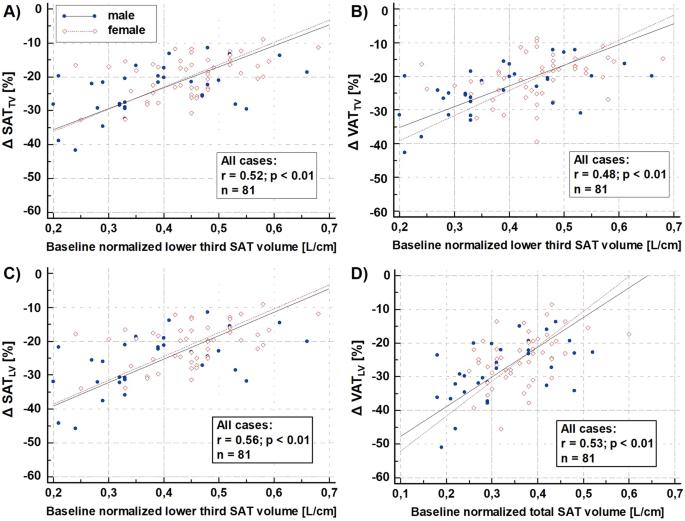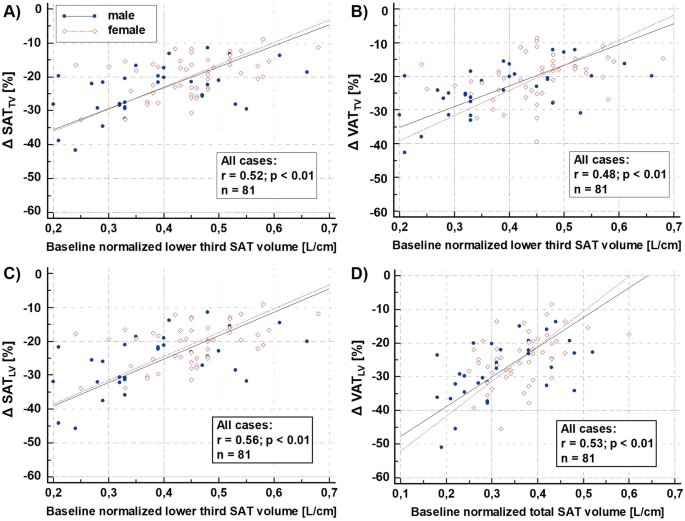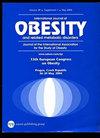Impact of baseline adipose tissue characteristics on change in adipose tissue volume during a low calorie diet in people with obesity—results from the LION study
IF 4.2
2区 医学
Q1 ENDOCRINOLOGY & METABOLISM
引用次数: 0
Abstract
Weight loss outcomes vary individually. Magnetic resonance imaging (MRI)-based evaluation of adipose tissue (AT) might help to identify AT characteristics that predict AT loss. This study aimed to assess the impact of an 8-week low-calorie diet (LCD) on different AT depots and to identify predictors of short-term AT loss using MRI in adults with obesity. Eighty-one adults with obesity (mean BMI 34.08 ± 2.75 kg/m², mean age 46.3 ± 10.97 years, 49 females) prospectively underwent baseline MRI (liver dome to femoral head) and anthropometric measurements (BMI, waist-to-hip-ratio, body fat), followed by a post-LCD-examination. Visceral and subcutaneous AT (VAT and SAT) volumes and AT fat fraction were extracted from the MRI data. Apparent lipid volumes based on MRI were calculated as approximation for the lipid contained in the AT. SAT and VAT volumes were subdivided into equidistant thirds along the craniocaudal axis and normalized by length of the segmentation. T-tests compared baseline and follow-up measurements and sex differences. Effect sizes on subdivided AT volumes were compared. Spearman Rank correlation explored associations between baseline parameters and AT loss. Multiple regression analysis identified baseline predictors for AT loss. Following the LCD, participants exhibited significant weight loss (11.61 ± 3.07 kg, p < 0.01) and reductions in all MRI-based AT parameters (p < 0.01). Absolute SAT loss exceeded VAT loss, while relative apparent lipid loss was higher in VAT (both p < 0.01). The lower abdominopelvic third showed the most significant SAT and VAT reduction. The predictor of most AT and apparent lipid losses was the normalized baseline SAT volume in the lower abdominopelvic third, with smaller volumes favoring greater AT loss (p < 0.01 for SAT and VAT loss and SAT apparent lipid volume loss). The LCD primarily reduces lower abdominopelvic SAT and VAT. Furthermore, lower abdominopelvic SAT volume was detected as a potential predictor for short-term AT loss in persons with obesity.


基线脂肪组织特征对肥胖症患者低热量饮食期间脂肪组织体积变化的影响--来自 LION 研究的结果。
背景/目的:减肥效果因人而异。以磁共振成像(MRI)为基础的脂肪组织(AT)评估可能有助于确定可预测 AT 减少的 AT 特征。本研究旨在评估为期 8 周的低热量饮食(LCD)对不同脂肪组织沉积的影响,并通过磁共振成像确定肥胖症成人短期脂肪组织减少的预测因素:81名肥胖成人(平均体重指数(BMI)34.08 ± 2.75 kg/m²,平均年龄(46.3 ± 10.97)岁,49名女性)前瞻性地接受了基线核磁共振成像(肝穹顶至股骨头)和人体测量(体重指数、腰臀比、体脂),随后接受了LCD后检查。从核磁共振成像数据中提取内脏和皮下反式脂肪组织(VAT 和 SAT)的体积以及反式脂肪组织的脂肪分数。根据核磁共振成像计算出的表观脂质体积是内脏和皮下内脏脂肪含量的近似值。SAT和VAT体积沿头尾轴被细分为等距的三等分,并按分割长度归一化。通过 T 检验比较基线和随访测量值及性别差异。比较了细分 AT 容量的效应大小。斯皮尔曼等级相关分析探讨了基线参数与 AT 损失之间的关联。多元回归分析确定了AT损失的基线预测因素:结果:接受 LCD 后,参与者的体重明显减轻(11.61 ± 3.07 千克,p 结论:LCD 主要减轻了下腹部肌肉的重量:LCD 主要减少了下腹骨盆 SAT 和 VAT。此外,还发现腹盆下部 SAT 体积是肥胖症患者短期 AT 减轻的潜在预测因素。
本文章由计算机程序翻译,如有差异,请以英文原文为准。
求助全文
约1分钟内获得全文
求助全文
来源期刊

International Journal of Obesity
医学-内分泌学与代谢
CiteScore
10.00
自引率
2.00%
发文量
221
审稿时长
3 months
期刊介绍:
The International Journal of Obesity is a multi-disciplinary forum for research describing basic, clinical and applied studies in biochemistry, physiology, genetics and nutrition, molecular, metabolic, psychological and epidemiological aspects of obesity and related disorders.
We publish a range of content types including original research articles, technical reports, reviews, correspondence and brief communications that elaborate on significant advances in the field and cover topical issues.
 求助内容:
求助内容: 应助结果提醒方式:
应助结果提醒方式:


